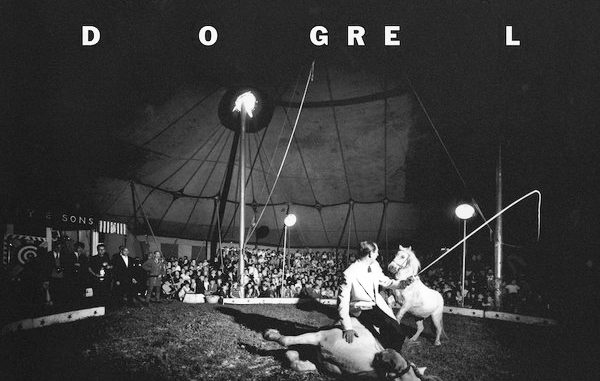
If the country’s literary canon is to be believed, growing up in Ireland necessitates cynicism and hope in equal parts. Even ignoring his lyrics, Fontaines D.C. frontman Grian Chatten exemplifies both these qualities in just his voice; his is a flat and sneering Dublin brogue, one that generally eschews melody in favor of half-spoken diatribes. While such a description might apply almost perfectly to his more vitriolic post-punk forebears such as The Fall’s Mark E. Smith, Chatten’s voice has a distinct tinge of romanticism not shared by his British compatriots: you can envision him exalting the green Irish countryside just as easily as you can imagine him eviscerating the gentrifiers behind Dublin’s recent tech boom. Indeed, this duality fuels “Dogrel.” A student of Yeats and Joyce, Chatten focuses the bulk of his lyricism on his storied and dynamic hometown, love letters written with just enough acid and pessimism to do his heroes proud.
Opening track “Big” is the album’s punchy, sub-two-minute thesis statement. Chatten jeers “My childhood was small / But I’m going to be big!” with cocksure conviction, calling into question how much of the song’s protagonist is a mockery of Dublin’s arrogant yuppies and how much is based on the experience of working-class kids like himself. On the bittersweet ballad “Roy’s Tune,” Chatten reflects on the weariness of life in an increasingly corporatized Ireland: “It was the message I heard when the company said / ‘There is no warning and there is no future’ / I like the way they treat me but I hate the way they use her.” The “her” Chatten refers to is Mother Ireland, the dream of a redheaded kid with “evergreen… lights in [his] eyes” who grows up and reckons with a government that cares more about whether Apple moves its headquarters. Elsewhere, Chatten muses upon grimy city streets (“Too Real”), xenophobia (“Boys in the Better Land”), and — perhaps inevitably — romantic pub scenes (“Dublin City Sky”). His ambitions may not be as broadly political or vitriolic as many of his contemporaries, but Chatten’s lyricism is focused and poetic enough to render “Dogrel” a convincing portrait of a complex present-day Ireland.
Like any post-punk band worth its salt, Fontaines D.C. counters Chatten’s acerbic lyricism with an anxious and jagged musical backdrop. The band synthesizes classic Gang of Four aesthetics with hooky surf rock and anxious punk noise. Guitarists Conor Curley and Carlos O’Connell’s alternate between spindly melodic lines and sinister atonality, with tricks like the bottleneck guitar on “Too Real” reminiscent of their noisier countrymen (and admitted influences) in Girl Band. “Dogrel” is Fontaines D.C.’s official debut, and they certainly play like a young band eager to show its hand; between ballads like “Roy’s Tune” and breathless bar-fight soundtracks like “Liberty Belle,” the Fontaines carve out a stylistic niche wide enough to give Chatten’s lyrics adequate breathing room. This, one could argue, is also testament to their unabashed Irishness. While they draw heavily upon their country’s musical and literary past, Fontaines D.C. reflect a modern Ireland that is fraught, evolving and complicated, all conveyed with the quick-witted sneer of an acerbic barkeep.
Subscribe to the Mossy Log Newsletter
Stay up to date with the goings-on at Lewis & Clark! Get the top stories or your favorite section delivered to your inbox whenever we release a new issue.

Leave a Reply